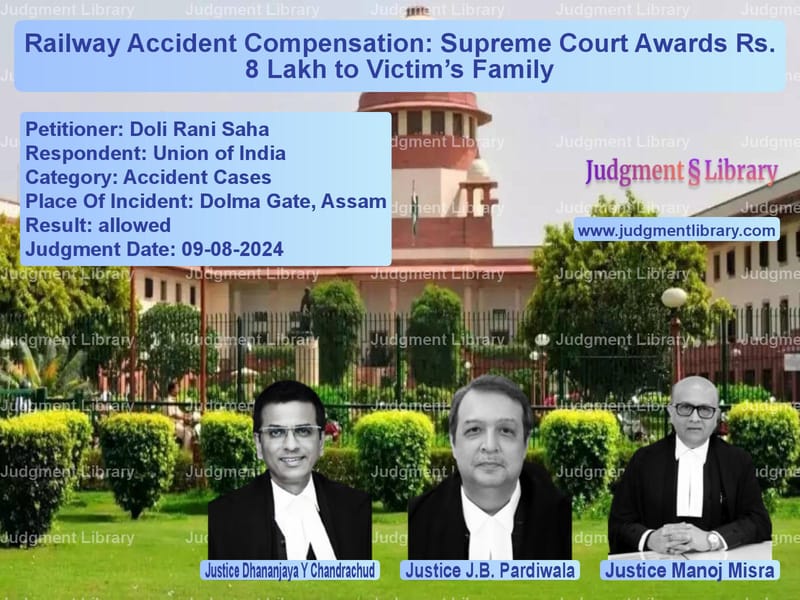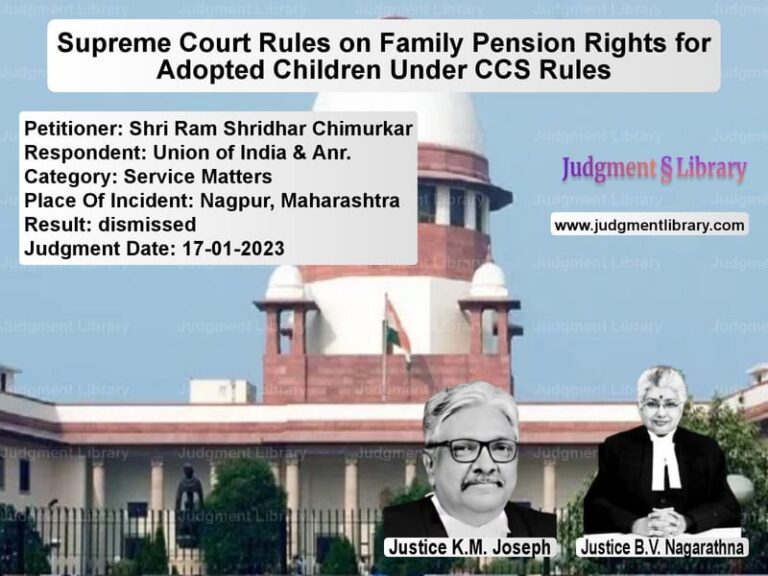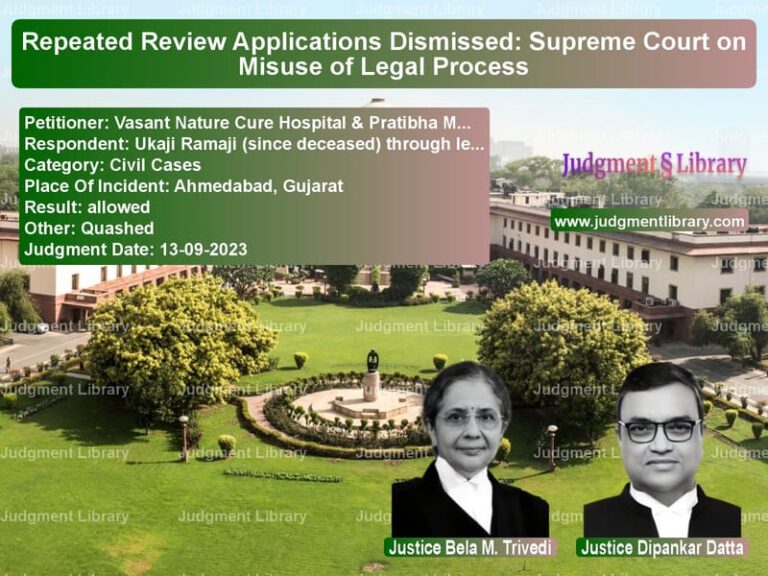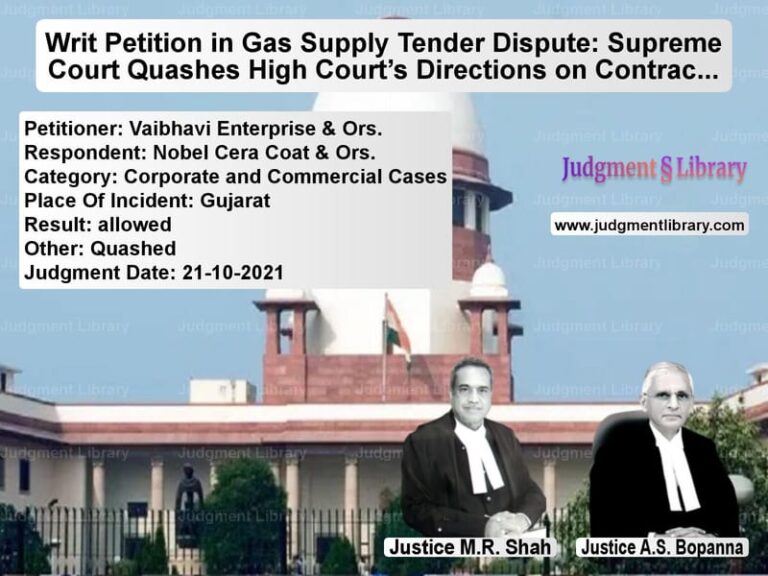Railway Accident Compensation: Supreme Court Awards Rs. 8 Lakh to Victim’s Family
The Supreme Court recently delivered a crucial judgment in the case of Doli Rani Saha vs. Union of India, reinforcing the right of railway accident victims’ families to compensation. The ruling provides clarity on the interpretation of the Railways Act, 1989, especially regarding the proof of a victim being a bona fide passenger and the application of the compensation framework under the Railway Accidents (Compensation) Rules.
Background of the Case
The case arose from a tragic railway accident on September 5, 2003, involving the Kanchanjanga Express. The victim, Swapan Kumar Saha, allegedly fell from the moving train at KM 373/9, Dolma Gate, and died due to severe head injuries. His body was discovered three days later, on September 8, 2003. Following his death, his sister, Doli Rani Saha, filed a claim for compensation before the Railway Claims Tribunal, seeking Rs. 4,00,000 under Section 16 of the Railway Claims Tribunal Act, 1987.
The Tribunal rejected the claim, ruling that there was insufficient evidence proving that the deceased was a bona fide passenger at the time of the accident. The Gauhati High Court upheld this decision in 2014, leading the petitioner to appeal before the Supreme Court.
Petitioner’s Arguments
The petitioner’s counsel contended that:
- The investigating officer’s report, dated November 6, 2003, confirmed that the deceased had suffered a fatal fall from the train.
- The post-mortem report attributed the cause of death to blunt force impact and estimated the time of death to be between 48 and 72 hours before the autopsy, aligning with the date of the accident.
- It is not mandatory to produce a train ticket to claim compensation under Section 124A of the Railways Act, as ruled in Union of India v. Rina Devi (2019).
- The delay in recovering the body does not negate the fact that the deceased was a railway passenger.
- The Tribunal and the High Court erroneously disregarded crucial evidence, including the IO’s report.
Respondent’s Arguments
The Union of India defended the Tribunal’s and High Court’s rulings, arguing that:
- No train ticket was recovered from the deceased, making it impossible to confirm his status as a bona fide passenger.
- Had the deceased fallen from a moving train, railway staff would have discovered the body sooner.
- The conclusions drawn by the investigating officer were speculative and lacked corroborative evidence.
- The High Court rightly observed that the post-mortem report did not conclusively establish that the victim died on September 5, 2003.
Supreme Court’s Observations
The Supreme Court, after thoroughly analyzing the case, made the following key observations:
- The Rina Devi judgment (2019) establishes that a claimant can prove passenger status through circumstantial evidence, and the absence of a ticket is not fatal to the claim.
- Once a claimant provides prima facie evidence (such as an affidavit or police records), the burden of proof shifts to the Railways to prove otherwise.
- The post-mortem report indicated that the victim suffered injuries from blunt force impact, corroborating the claim that he fell from the train.
- The Investigating Officer’s report, based on eyewitness accounts and forensic evidence, was unfairly disregarded by the Tribunal and the High Court.
- Railway authorities failed to provide any counter-evidence proving that the deceased was not a passenger.
Final Judgment
On August 9, 2024, the Supreme Court ruled in favor of the petitioner:
- The deceased was a bona fide railway passenger and died in an untoward incident under Section 124A of the Railways Act.
- The petitioner is entitled to Rs. 8,00,000 as compensation, in accordance with the latest amendment to the Railway Accidents (Compensation) Rules, 2016.
- The amount must be paid by September 30, 2024, failing which it will accrue interest at 6% per annum until fully paid.
- The District Legal Services Authority, Kokrajhar, will assist in ensuring the seamless transfer of compensation to the petitioner.
Implications of the Judgment
This ruling has significant legal implications:
- Strengthening Passenger Rights: The Court reaffirmed that railway accident victims’ families need not produce a ticket to claim compensation.
- Burden of Proof on Railways: The judgment clarifies that once prima facie evidence is provided, the burden shifts to the Railways to disprove the claim.
- Speedy Compensation: The ruling underscores that railway accident compensation should be determined based on factual evidence rather than technicalities.
Conclusion
The Supreme Court’s verdict ensures justice for families of railway accident victims by setting a strong precedent on compensation claims. By granting Rs. 8,00,000 in compensation, the judgment reinforces the principle that technical lapses should not deprive victims’ families of their rightful claims.
Petitioner Name: Doli Rani Saha.Respondent Name: Union of India.Judgment By: Justice Dhananjaya Y Chandrachud, Justice J.B. Pardiwala, Justice Manoj Misra.Place Of Incident: Dolma Gate, Assam.Judgment Date: 09-08-2024.
Don’t miss out on the full details! Download the complete judgment in PDF format below and gain valuable insights instantly!
Download Judgment: doli-rani-saha-vs-union-of-india-supreme-court-of-india-judgment-dated-09-08-2024.pdf
Directly Download Judgment: Directly download this Judgment
See all petitions in Compensation Disputes
See all petitions in Negligence Claims
See all petitions in Road Accident Cases
See all petitions in Public Interest Litigation
See all petitions in Judgment by Dhananjaya Y Chandrachud
See all petitions in Judgment by J.B. Pardiwala
See all petitions in Judgment by Manoj Misra
See all petitions in allowed
See all petitions in supreme court of India judgments August 2024
See all petitions in 2024 judgments
See all posts in Accident Cases Category
See all allowed petitions in Accident Cases Category
See all Dismissed petitions in Accident Cases Category
See all partially allowed petitions in Accident Cases Category







